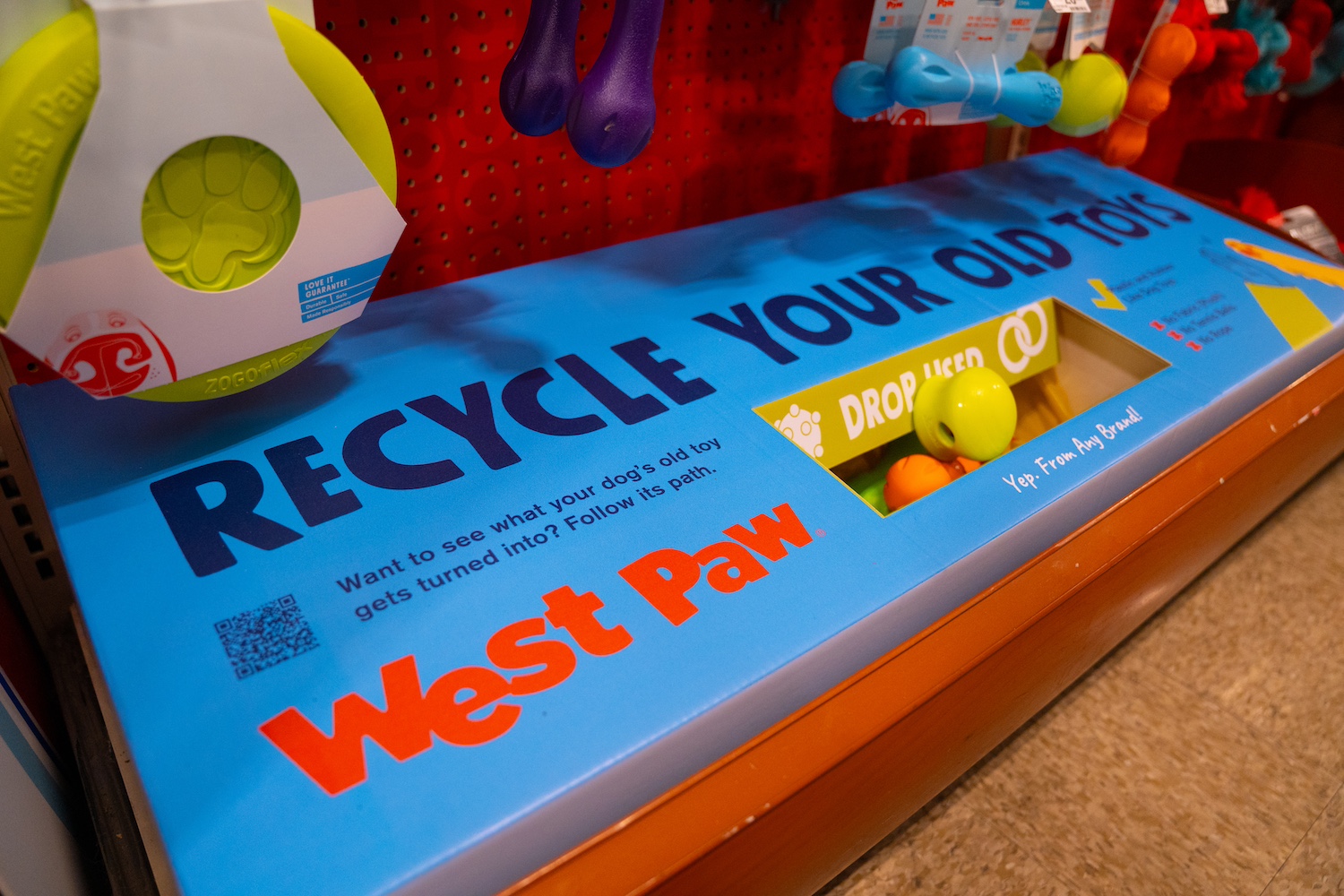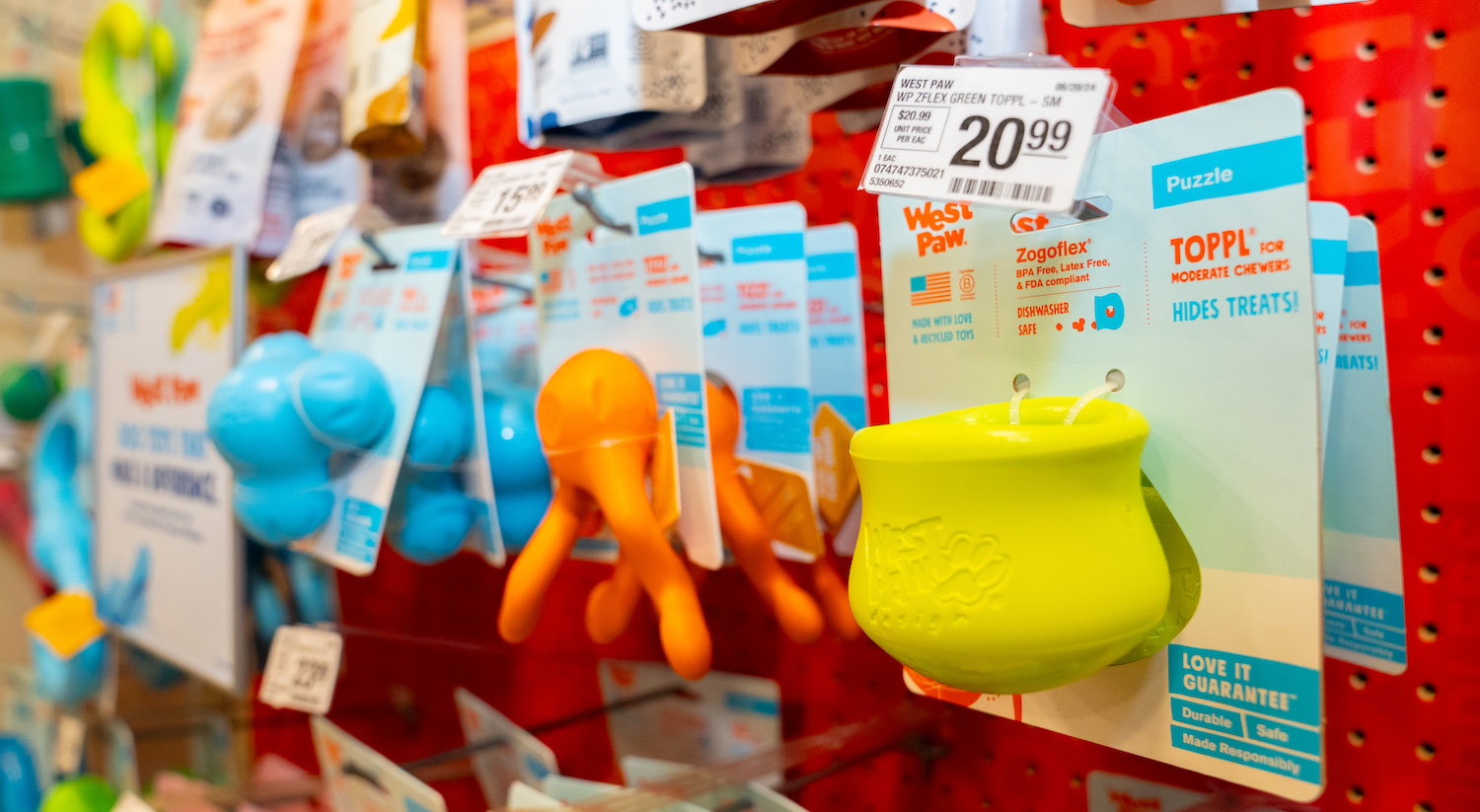
(Image: Anna Dudkova/Unsplash)
“Seventy percent of pet parents are looking for ways to make a positive impact on the environment,” Joanne Dwyer, vice president of corporate social responsibility and sustainability at PetSmart, told TriplePundit. “They want to be able to do that through easy, small changes that they can make in their daily life.” Which is why PetSmart is partnering with sustainable dog product maker West Paw to pilot an in-store toy takeback program.
They’re testing the pilot, which began last month, in 75 PetSmart stores across California, Oregon, Washington and Arizona. It’s starting on the West Coast market because of a higher likelihood of consumer participation, Dwyer said. The pilot was originally slotted for three months, but it may be extended. The hope is that it will be successful enough to make it worth expanding to more stores.
West Paw accepts its own Zogoflex and Seaflex toys by mail as part of its Join the Loop recycling program, but the partnership with PetSmart allows any brand of plastic or rubber dog toy to be reborn as new toys and products. All customers have to do is bring their furry friends’ worn-out toys with them on their next trip to a participating PetSmart and deposit them in the bin at the West Paw display. Recycling is limited to plastic and rubber — meaning no tennis balls, ropes, plushies or mixed material toys.

In addition to expanding West Paw’s takeback capacity to include other brands, the partnership with PetSmart eliminates the added waste and emissions associated with mailing the toys in.
“We're putting those toys on our own trucks that already travel back to our distribution centers,” Dwyer said, adding that the toys are sent to distribution centers near a West Paw recycler. “Being able to leverage that reverse logistics system is critical [to] sustainability ... because we're not adding extra freight as we would if we were mailing something.”
Once the toys are with the recycler they are separated and turned into pellets. The pellets are used to make new Zogoflex products — which are made of rubber and plastic and can be recycled in the same manner over and over again — and Seaflex products, which are made of a combination of Zogoflex and ocean-bound plastic.
While it’s too soon to know the impact of the in-store takeback program, Dwyer noted that West Paw recycled over 102,000 pounds of material into Zogoflex and Seaflex in 2023 alone. Not all of this comes from old toys, of course. The company also converts other plastic waste into pet products. By 2020, it salvaged over 16 million plastic bottles that would have otherwise gone to landfills.

“The volume of the toys that we collect is going to be one of the biggest metrics,” Dwyer said of how the pilot’s success will be measured. “[But] we're also going to be very interested in the customer feedback around the ease of use because, again, is this something that we can expect them to do over and over again? Is it easy enough? Memorable enough?”
Consumer response is positive so far. They appear excited about the toy takeback option, she said. Employee feedback will also be integral in measuring the program’s viability. If associates have to remove a substantial amount of items that don’t fit the recycling parameters, the company will have to rethink how the program is communicated.
Ultimately, the pilot’s success hinges on changing consumer behavior, which Dwyer recognizes as a significant challenge. Another is that the pet industry overall is behind on environmental action. “We don’t have a lot of opportunities, partnerships or avenues by which we talk about this within the pet industry,” she said.
PetSmart is also looking to change consumer behavior and give environmentalism in the pet industry a big bump with a second pilot later this summer. The pet supply company will partner with the recycling business TerraCycle to take back multi-layer pet food and treat bags that can’t be recycled through traditional means. That’s a big step in the right direction considering that the industry is responsible for 300 million pounds of plastic packaging annually, with 99 percent of the multi-layered stuff destined for unsustainable disposal.
“Part of what I think is important is we're really trying to make more sustainable products, like the West Paw product line, more accessible to all customers so that they aren't only found in sort of niche areas. We're trying to democratize sustainability,” Dwyer said. “We want everybody to be able to access these products that are better for our pets, better for the planet. Just seeing the initial response from customers on social media and hearing from some of our associates in stores has been really, for me, very hopeful and optimistic.”

Riya Anne Polcastro is an author, photographer and adventurer based out of Baja California Sur, México. She enjoys writing just about anything, from gritty fiction to business and environmental issues. She is especially interested in how sustainability can be harnessed to encourage economic and environmental equity between the Global South and North. One day she hopes to travel the world with nothing but a backpack and her trusty laptop.














